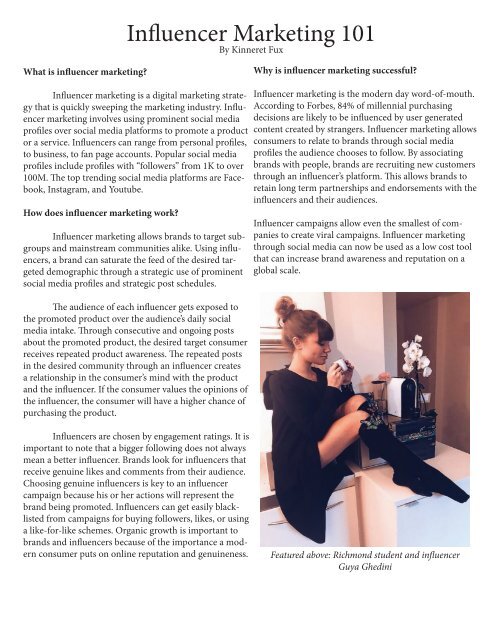RUONCAMPUS MAGAZINE FINAL Version
Create successful ePaper yourself
Turn your PDF publications into a flip-book with our unique Google optimized e-Paper software.
Influencer Marketing 101<br />
By Kinneret Fux<br />
What is influencer marketing?<br />
Why is influencer marketing successful?<br />
Influencer marketing is a digital marketing strategy<br />
that is quickly sweeping the marketing industry. Influencer<br />
marketing involves using prominent social media<br />
profiles over social media platforms to promote a product<br />
or a service. Influencers can range from personal profiles,<br />
to business, to fan page accounts. Popular social media<br />
profiles include profiles with “followers” from 1K to over<br />
100M. The top trending social media platforms are Facebook,<br />
Instagram, and Youtube.<br />
How does influencer marketing work?<br />
Influencer marketing allows brands to target subgroups<br />
and mainstream communities alike. Using influencers,<br />
a brand can saturate the feed of the desired targeted<br />
demographic through a strategic use of prominent<br />
social media profiles and strategic post schedules.<br />
The audience of each influencer gets exposed to<br />
the promoted product over the audience’s daily social<br />
media intake. Through consecutive and ongoing posts<br />
about the promoted product, the desired target consumer<br />
receives repeated product awareness. The repeated posts<br />
in the desired community through an influencer creates<br />
a relationship in the consumer’s mind with the product<br />
and the influencer. If the consumer values the opinions of<br />
the influencer, the consumer will have a higher chance of<br />
purchasing the product.<br />
Influencer marketing is the modern day word-of-mouth.<br />
According to Forbes, 84% of millennial purchasing<br />
decisions are likely to be influenced by user generated<br />
content created by strangers. Influencer marketing allows<br />
consumers to relate to brands through social media<br />
profiles the audience chooses to follow. By associating<br />
brands with people, brands are recruiting new customers<br />
through an influencer’s platform. This allows brands to<br />
retain long term partnerships and endorsements with the<br />
influencers and their audiences.<br />
Influencer campaigns allow even the smallest of companies<br />
to create viral campaigns. Influencer marketing<br />
through social media can now be used as a low cost tool<br />
that can increase brand awareness and reputation on a<br />
global scale.<br />
Influencers are chosen by engagement ratings. It is<br />
important to note that a bigger following does not always<br />
mean a better influencer. Brands look for influencers that<br />
receive genuine likes and comments from their audience.<br />
Choosing genuine influencers is key to an influencer<br />
campaign because his or her actions will represent the<br />
brand being promoted. Influencers can get easily blacklisted<br />
from campaigns for buying followers, likes, or using<br />
a like-for-like schemes. Organic growth is important to<br />
brands and influencers because of the importance a modern<br />
consumer puts on online reputation and genuineness.<br />
Featured above: Richmond student and influencer<br />
Guya Ghedini


